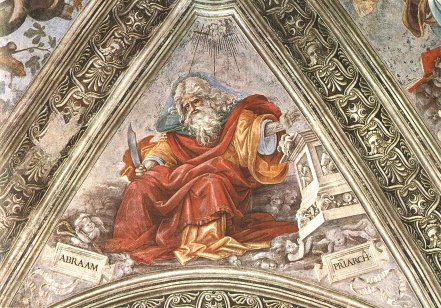 That’s exactly what God does! The Babel experience seems to end God’s attempt to deal with all of humanity at once. Cursed with different languages and scattered to their assigned territories, the nations of the world are put aside. God starts with one—Abram of Ur. Why Abram? The story does not say. God’s choice is based on grace—even this first patriarch cannot earn his place in God’s favor.
That’s exactly what God does! The Babel experience seems to end God’s attempt to deal with all of humanity at once. Cursed with different languages and scattered to their assigned territories, the nations of the world are put aside. God starts with one—Abram of Ur. Why Abram? The story does not say. God’s choice is based on grace—even this first patriarch cannot earn his place in God’s favor.
Notice how the writing style has changed. In the pre-history part of Genesis the stories are short and characters are not developed. No one engages in prolonged conversation. As we read the stories of the patriarchs, we are dealing with the people who really matter to the authors: the ancestors of Israel.
With this story of election, we have reached a core teaching of the Scriptures: the divine choice of a people to bear God’s message. While God spoke to other people before (Noah, Adam, Eve); in each case they represented all humanity. There were no promises made for them and them alone. Abram is a different case. He is now the key player in God’s game plan of blessing. What that blessing looks like remains to be seen, but we can compare the original blessing God gives to his creation (Genesis 1:22) with that given to Abram. The charge is almost the same. Beginning with Abram, to his descendants, and on to Christ’s people, God’s people are chosen by God to bear that blessing. Election seems unfair (especially as it unfolds in the first generations) and arbitrary, but we can’t ignore the concept.
Abram receives two promises: 1) that he will be a great nation that will bless all other nations and 2) that he will receive territory—the Promised Land. Although both promises will be renewed and expanded, neither will be fulfilled in Abram’s lifetime.
The promise of children—the nation that will bless all others—will prove to be complicated. Only Sarai can be the mother of that promised nation; while Abram has other children, they all drop out of the story. Abram himself puts the promise in jeopardy: twice passing Sarai off as his wife, having a child by Hagar.
God and Abram have a unique relationship. Twice God defines that relationship with a covenant. In both cases the promises of the covenant belong to God—Abram’s acceptance is almost passive—simply following along with the plan. In the second covenant, brought to us by the Priestly editor who cares about such things, the sign of the covenant, circumcision is added. But even here, there are no conditions—the covenant will not be negated if Abraham’s heirs do not circumcise. Abraham can also have a conversation with God—even challenging his plans. Finally, Abraham is the first person whose name is changed by God. Names have to do with destiny and identity in Genesis. Clearly, God has changed Abraham’s destiny and identity.
Even here, as this first covenant defines insiders and outsiders, the divine blessing spills over. Hagar, the slave woman who is not the bearer of the promise, nevertheless receives a promise of her own, one that does not seem to be part of God’s initial plan. She is also the only person to give God a name.
Some questions to consider:
How do you understand the idea of God’s choosing a nation? Does it seem fair?
What does Abraham’s success say about God’s blessing? What part does material blessing play in our faith today?
